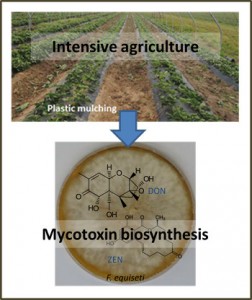In this post, a joint master thesis by the working groups of Environmental and Soil Chemistry and Quantitative Landscape Ecology on the detection of mycotoxins in aquatic systems is advertized.
 Mycotoxins are secondary metabolites produced by fungi, which may exert toxic effects in ecosystems. Deoxinivalenol (DON) and Zearalenone (ZEN) are two mycotoxins produced by the genera Fusarium sp., and have been detected in aquatic systems in the concentration range of ng/L to µg/L. Fusarium mycotoxins are produced at pre-harvest stages, therefore their occurrence in aquatic systems is primarily attributed to runoff from contaminated crops. The toxic effects of Fusarium toxins to humans and domestic animals are well known, whereas their effects on aquatic organisms, and consequently their ecotoxicological relevance, remains unknown. The aim of this study is to assess the concentration of relevant mycotoxins, i.e. DON, ZEN, Enniatins and T-2 toxin, and their transformation products (masked mycotoxins) in river water systems. A range of streams in Southern Rhineland Palatinate will be sampled with an assumed gradient in mycotoxine input. Solid phase extraction will be employed as clean-up method and quantification will be done via liquid chromatography with mass spectrometry.
Mycotoxins are secondary metabolites produced by fungi, which may exert toxic effects in ecosystems. Deoxinivalenol (DON) and Zearalenone (ZEN) are two mycotoxins produced by the genera Fusarium sp., and have been detected in aquatic systems in the concentration range of ng/L to µg/L. Fusarium mycotoxins are produced at pre-harvest stages, therefore their occurrence in aquatic systems is primarily attributed to runoff from contaminated crops. The toxic effects of Fusarium toxins to humans and domestic animals are well known, whereas their effects on aquatic organisms, and consequently their ecotoxicological relevance, remains unknown. The aim of this study is to assess the concentration of relevant mycotoxins, i.e. DON, ZEN, Enniatins and T-2 toxin, and their transformation products (masked mycotoxins) in river water systems. A range of streams in Southern Rhineland Palatinate will be sampled with an assumed gradient in mycotoxine input. Solid phase extraction will be employed as clean-up method and quantification will be done via liquid chromatography with mass spectrometry.
The Master thesis will be supervised by K. Muñoz, working group of Environmental and Soil Chemistry, and R. Schäfer, Quantitative Landscape Ecology
Requirements: Experience in environmental analysis i.e. Solid phase extraction, chromatographic methods and water analysis preferred
Further information: Dr. K. Muñoz, munoz@uni-landau.de
